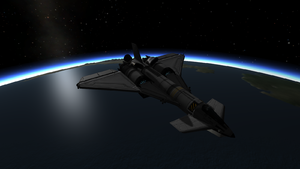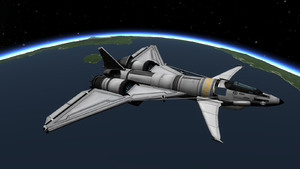Difference between revisions of "Aeris 4A"
(clean up formatting) |
(added some info about 23.5 and strutting) |
||
| Line 33: | Line 33: | ||
* Remove the [[Inline Advanced Stabilizer]], as it's really not necessary with the changed SAS system. The cockpit now provides both sufficient reaction wheel torque and SAS. Atmospheric handling is arguably improved with less torque. | * Remove the [[Inline Advanced Stabilizer]], as it's really not necessary with the changed SAS system. The cockpit now provides both sufficient reaction wheel torque and SAS. Atmospheric handling is arguably improved with less torque. | ||
* Move the nose wheel backwards, under the main body (e.g. under the docking port body section), to eliminate the approximately 2° nose down attitude when sitting on its wheels. This also helps to reduce body flex when sitting on the wheels. It is also possible to rotate the wheel so it's folds forward like the wheels mounted at the rear. | * Move the nose wheel backwards, under the main body (e.g. under the docking port body section), to eliminate the approximately 2° nose down attitude when sitting on its wheels. This also helps to reduce body flex when sitting on the wheels. It is also possible to rotate the wheel so it's folds forward like the wheels mounted at the rear. | ||
| − | * Add struts between the cockpit and fuel tank or wings, to reduce flexing around the RCS tank and docking port. | + | * Add struts between the cockpit and fuel tank or wings, to reduce flexing around the RCS tank and docking port (now obselete as of '''23.5''', as node connections have been revamped). |
* Add [[Battery|batteries]] and [[solar panel]]s, for extended duration orbiting. | * Add [[Battery|batteries]] and [[solar panel]]s, for extended duration orbiting. | ||
* Change the [[AV-R8 Winglet]]s to [[Advanced Canard]]s on the nose, and [[Standard Canard]] on the tail, for improved handling. | * Change the [[AV-R8 Winglet]]s to [[Advanced Canard]]s on the nose, and [[Standard Canard]] on the tail, for improved handling. | ||
Revision as of 06:23, 5 August 2014

The Aeris 4A is a manned stock spaceplane with single-stage-to-orbit capabilities. With sufficient piloting skill it is capable of reaching a 100 km circular Kerbin orbit, docking with another craft in orbit and returning safely to the ground without decoupling any parts.
Features
The Aeris 4A is equipped with two TurboJet Engines for atmospheric flight. The intake air is provided by four Radial Air Intakes and two Ram Air Intakes. For orbital flight, one LV-T30 Liquid Fuel Engine is provided. The rocket engine will first feed from the tanks mounted to the jet engines. So after descending and prior to reactivating it is important to check that there is liquid fuel for the jet engines available.
Four RV-105 RCS Thruster Blocks and four Place-Anywhere 7 Linear RCS Ports are added for orbital control, allowing both rotational and translational movement.
With an Inline Clamp-O-Tron docking port facing upwards, it is possible to dock with other craft.
Action Groups
For faster switching between atmospheric and orbital flight, the Aeris 4A has four action groups predefined:
- Activate turbojet engines
- Activate liquid fuel engine
- Shutdown jet engines, toggle intakes
- Open docking port
Its engines are supposed to be controlled through action groups, not through staging.
Possible improvements
Whilst the supplied plane does perform ok, there is some scope for tweaking and/or improving the design, with some quick and easy changes. These are just some basic ideas and things to try out:
- Change the LV-T30 Liquid Fuel Engine to the Toroidal Aerospike Rocket, to reduce the chance of a tail strike on takeoff and landing, and arguably improve aesthetics. The aerospike engine is also more fuel-efficient, but has only 81% of the thrust (still sufficient to achieve a 100 km circular orbit from a 20 km transition from jets).
- Change action groups 2 & 3 to toggle the engines, instead of just activating them. It is also possible to change the first action group, but this is only required for starting the engines on the runway.
- Remove the Inline Advanced Stabilizer, as it's really not necessary with the changed SAS system. The cockpit now provides both sufficient reaction wheel torque and SAS. Atmospheric handling is arguably improved with less torque.
- Move the nose wheel backwards, under the main body (e.g. under the docking port body section), to eliminate the approximately 2° nose down attitude when sitting on its wheels. This also helps to reduce body flex when sitting on the wheels. It is also possible to rotate the wheel so it's folds forward like the wheels mounted at the rear.
- Add struts between the cockpit and fuel tank or wings, to reduce flexing around the RCS tank and docking port (now obselete as of 23.5, as node connections have been revamped).
- Add batteries and solar panels, for extended duration orbiting.
- Change the AV-R8 Winglets to Advanced Canards on the nose, and Standard Canard on the tail, for improved handling.
- Add a ladder onto the cockpit.
- Unlock steering on the front wheel using the right-click tweakables menu.
After some of those improvements the centers of mass and lift may change which should be compensated by adjusting the wings forwards or backwards.
See also
- Tutorial:Aeris 4A mission, a tutorial on how to launch this craft
- Images of Aeris 4A


